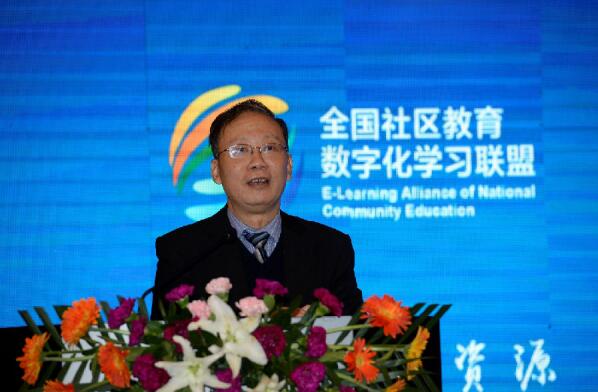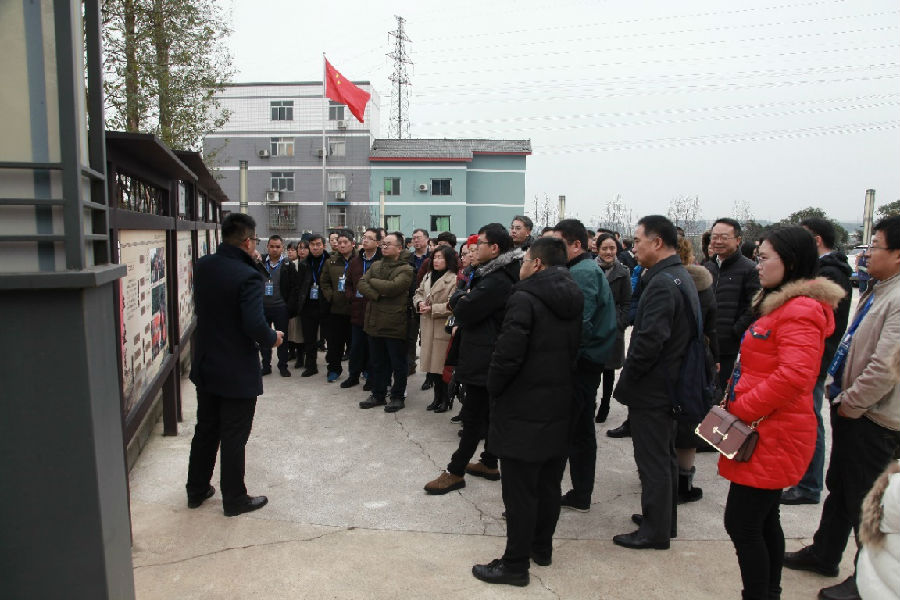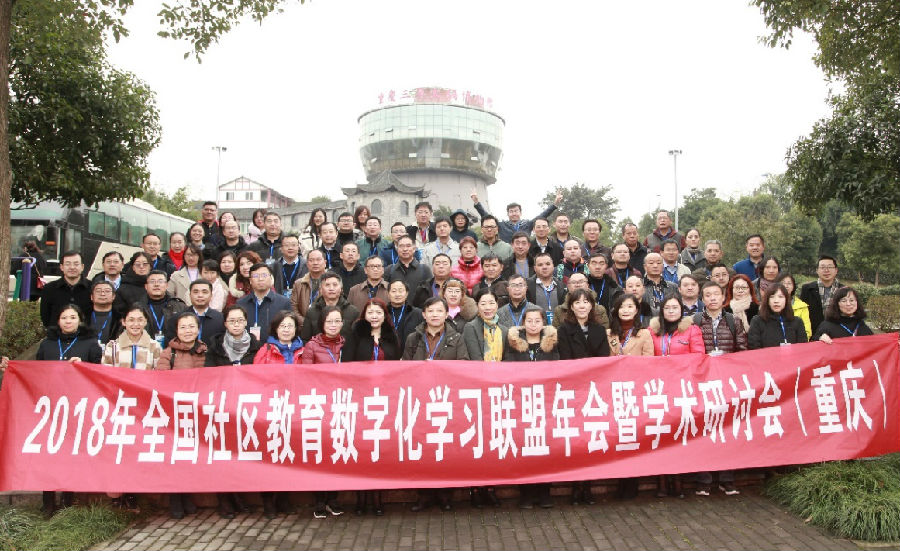 On 27-28 December, 2018, the 2018 Annual Conference and Seminar of the E-Learning Alliance of National Community Education (“the alliance”) was held in Chongqing. The conference was hosted by it the Research and Training Center for Community Education of the Ministry of Education (MOE), and organised with the help of the Jiulongpo Community Education College in Chongqing.
On 27-28 December, 2018, the 2018 Annual Conference and Seminar of the E-Learning Alliance of National Community Education (“the alliance”) was held in Chongqing. The conference was hosted by it the Research and Training Center for Community Education of the Ministry of Education (MOE), and organised with the help of the Jiulongpo Community Education College in Chongqing.
This was the first annual conference since the establishment of the alliance, and 217 representatives from 118 units in 27 provinces and municipalities throughout the country attended. Zhou Yanjun and Zhou Jiping, alliance vice presidents, chaired the conference.


On behalf of vice president Zhang Zhaowen of the China Adult Education Association (CAEA), its deputy secretary-general Zhang Zhupeng gave a speech at the conference in praise of the year of work the alliance had done since its establishment. He indicated that the CAEA was paying great attention to promoting the use of information technology while normalising and systemising the development of community education. It serves community education and alliance members all over the country in a diverse, professional and creative way, and has made remarkable strides in bringing information technology into community education and promoting the building and sharing of quality e-learning resources. The alliance hopes to continue to help promote the development of community education in China, especially in relation to the integration of information technology.

Vice president Ju Chuanjin of the Open University of China (OUC) also gave a speech. He indicated that developing urban and rural community education is part of the development of continuing education nationwide. The OUC is a new type of university, available to all citizen throughout their lives, and community education is a significant aspect of its mission. It is helping develop it by acting as the MOE Research and Training Center for Community Education, establishing experimental centers and bases for community education, and cooperatibg with over 10 major cities, putting to use its experience in the application of digital technologies. Strong support has been given to the National E-Learning Resource Center to take the lead in setting up the alliance and enabling it to provide services to all kinds of community-education institutions at all levels throughout the country. He spoke highly of the work of the alliance in promoting the use of digital technology in community education over the past year through micro-courses and projects, and expressed the hope that it would continue innovating.
President Shan Congkai delivered a report on the work of the alliance titled “Openness, Sharing, Coordination and Innovation: Promoting the Reform of E-Learning in Community Education”. He said the work of the alliance over the past year had had four aspects: developing its organisation and establishing its official website; promoting resource sharing; strengthening digital infrastructure; and advancing community e-learning. The alliance has grown from 73 member units to 145; has built and put online its official website; has offered 5000 “seed” courses and established a mechanism for exchange of resources among members; set up sharing of award-winning courses, offering members 113 award-winning micro courses free of charge (out of 500 in total), with 48,000 for sharing; has launched a community-education online platform via WeChat and a special app; has given approval to another 7 units to participate in the “E-Learning in Community Education” action; has organised the “Fourth NERC Micro-Course Competition” and the “First NERC ‘Internet +’ Community-Education Competition”; has promoted education-based poverty-alleviation; has conducted research into the use of micro courses in community education; and so on. All of this has given the alliance a solid foundation for its future development as an organisation and business. According to Shan Congkai, its work in 2019 is, first, to upgrade the official website, launch the “Rixin Learning Network” for institutions and individual learners, and create a community cloud-classroom and courier station; second, to continue building community e-learning resources and courses directed at poverty-alleviation, introduce 100 new community-education courses, and create a “community course box”; third, to optimise sharing and introduce quality resources from other countries; fourth, to conduct poverty alleviation through e-learning and serve the national poverty-alleviation strategy; and fifth, to continue holding competitions mentioned, carry out research into community-education resources, continue growing the alliance’s membership, and enhance its capacity to serve community education. He said the alliance will continue to innovate and to work hard to achieve its goal of “promoting e-learning to boost the reform of community education”.
The opening ceremony of the “Rixin Learning Network”, certification of new members of the alliance, a resource-donation ceremony, and the awards ceremony for the NERC competitions were also held during the conference.

Opening ceremony of the “Rixin Learning Network”

Certification of new alliance members, and resource-donation ceremony

Awards for excellent community-education micro courses

Awards for excellent “Internet +”community-education projects
Vice chairman Wang Fanzhen of the alliance’s committee of experts gave a speech on her research into developing micro courses for community education. She gave suggestions on grasping the attributes of micro courses, improving the ability to supply them, developing course resources, and placing the courses online.

Other speeches were given to share practical experience related to community education. Secretary Song Yifang of the CPC Changning District Community College of Shanghai spoke on the “Cloud Video Classroom”; associate professor Zhang Junhui on “Superior Learning Puts Learning Within Reach”; director Wang Kun of the Training Division of Tianjin Radio and TV University on “Embroidering a Good Life: the ‘Internet + Intangible Cultural Heritage + Poverty Alleviation’Project”; director He Quanlong of the Bao’an Vocational Training Bureau (City College) of Shenzhen on “New Community-education Practices in Shenzhen”; secretary Wu Xiaomei of the CPC Committee of the Jiulongpo Community Education College in Chongqing on “Popularization of E-Learning in Community Education”; director Wang Xingmin of the CCTV Field Survival Programme on “Outdoor Sports and Community Education”; and vice president Pang Hailong of the Vocational and Teacher-education Branch of the Beijing Normal University Publishing Group on “New Era, New Seniors, New School: the Development of Media-convergence Courses in Community Education”.

The delegates also visited the Community Education Centre at the Jiulongpo Community Education College in Chongqing, conversing with staff there on the construction of rural community-education bases, including ones with regional characteristics.
Zhou Yanjun gave a closing speech on the work report of the alliance and the exchange speeches [?]by bringing together construction of rules and systems of community education, government input, building of institutions and educational systems, training of teachers and management teams, sharing of e-learning resources, promotion of continuing education, integration of vocational and community education, progress in community-education research, and the problems that will need attention in the immediate future.
By Wang Qiang and Sun Fuguo, OUC